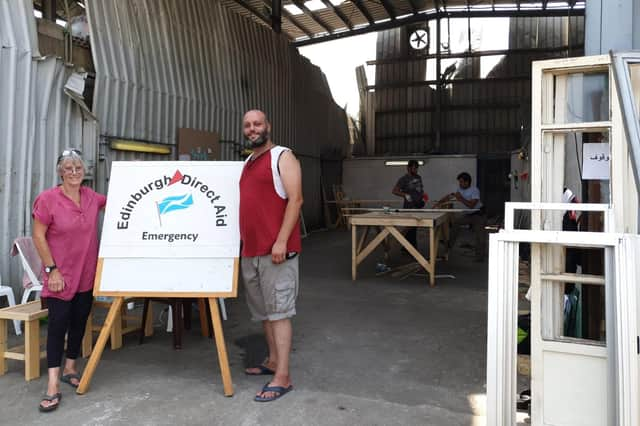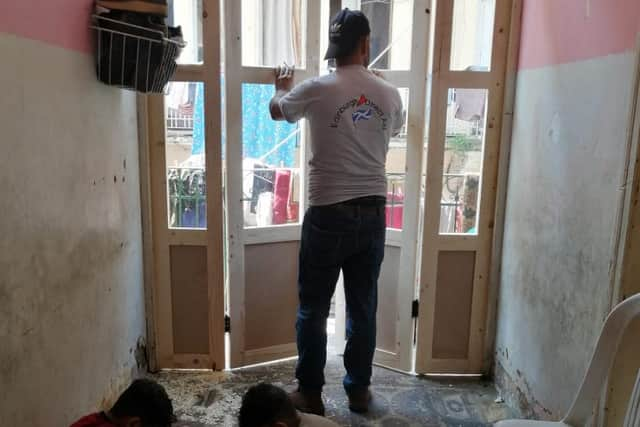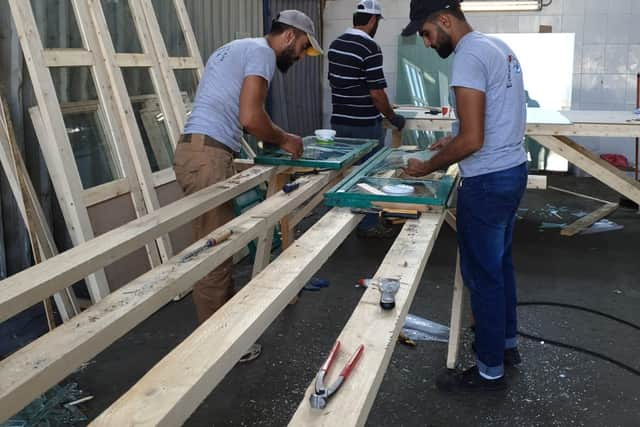The Scots charity and the Syrian refugees helping to rebuild Beirut


He sets off for the worst affected swaths shortly after 6am, and it is close to 8pm by the time he gets home. The days mostly pass by in a blur, spent amongst jumbles of broken masonry, shattered wood, and shards of glass. These are the footprints of the homes where people used to live; the footprints where some still do.
Only this morning, the 34-year-old and his colleagues came across a woman sheltering in an exposed, rubble-strewn flat after her door and windows were blown out in the explosion. With no family, and no means of repairing the damage, she had to wait until help arrived.
Advertisement
Hide AdAdvertisement
Hide AdIt is not just the poor in search of respite. Nabil, a tall, friendly figure in a vest top and flip-flops, tells the story of being approached by a panicked wealthy woman in need of assistance. The blast devastated her home, and the economic crisis which has engulfed Lebanon has crippled its banking system. Nabil wants to help as much as can.


“There is a lot of work to be done here, and we are happy to help people in Lebanon, because they have big needs with the rain and the winter coming,” he said. “We came here when the war started, and we want to help them so they can help us.”
Nabil is the project manager in a seven strong-team of Syrian refugees attempting to rebuild areas of Beirut one door and one window frame at a time, thanks to the help of Scottish charity Edinburgh Direct Aid.
Within four days of the 4 August explosion, Nabil and his compatriots had left their loved ones behind in the north-east town of Arsal, travelling three hours west to the Lebanese capital. The scale of the challenge, coupled with strict restrictions imposed to contain the spread of Covid-19, means they have yet to be reunited.
There is an irony in these young men, forced to flee their own homes back in Syria, helping the reconstruction effort in a country that has not always been sympathetic to their plight.


The Lebanese authorities have demolished some of the makeshift refugee camps in the dusty wadis surrounding Arsal, but Nabal wants to build a better life for others, as well as for his young son and daughter.
Maggie Tookey, field operations director for Edinburgh Direct Aid, has been overseeing the reconstruction effort in Beirut. Even four weeks after she set foot in the city, the veteran aid worker finds it difficult to comprehend the scale of the destruction.
“I don’t like to say that what we’re doing is a drop in the ocean, because we’ve put in hundreds and hundreds of new panes of glass and front doors, and made houses watertight,” she said.
Advertisement
Hide AdAdvertisement
Hide Ad“But the devastation is beyond anything I have ever seen. I can’t do it justice with a description. Every day I am more and more gobsmacked by what I see.”
Edinburgh Direct Aid’s relief effort is centred around a modest workshop constructed in the impoverished Karantina area, near the remains of the blast’s epicentre by Beirut’s port.
Having set up vocational training programmes in Arsal five years ago, the charity has helped refugees learn new trades. Now, an initiative designed to help displaced Syrians fend for themselves has helped hundreds of families to date in the capital.
Those in the city alongside Nabil include trained carpenters, construction workers, and engineers. Neither they nor Ms Tookey ever thought their skills would be put to such vital use.
“We never expected the vocational training would be applied in a situation like this,” she said. “Our Syrian team mostly deal with people in Arsal who are renting buildings, but due to the economic collapse in Lebanon, they can’t pay their rent and are being thrown out by landlords.
“They have to go into camps with cement floors and wooden frames, and our teams have a lot of experience in building places that are watertight and secure. So the skills they have are really useful in Beirut at the moment.”
Edinburgh Direct Aid, which has been working in partnership with the Green Helmets, one of several NGOs which stepped in in the wake of the shambolic response by the Lebanese government, is not sure when the work will end. No one in Beirut is.
The small charity, based in the Newhaven area of Edinburgh, set aside £7,500 for its efforts in Beirut. That money has already gone, eaten up by the need to source wood, glass, and aluminium. Ms Tookey said that even though the world’s gaze had moved on from Beirut, the city’s plight remains desperate.
Advertisement
Hide AdAdvertisement
Hide AdShe added: “This is a catastrophe which is ongoing. The needs of people here are growing every day, and I just don’t know how we’re going to get through it, but we will, somehow.”
To find out more about the charity’s work, and donate to its work in Beirut, visit https://www.edinburghdirectaid.org
A message from the Editor:
Thank you for reading this story on our website. While I have your attention, I also have an important request to make of you.
The dramatic events of 2020 are having a major impact on many of our advertisers - and consequently the revenue we receive. We are now more reliant than ever on you taking out a digital subscription to support our journalism.
Subscribe to scotsman.com and enjoy unlimited access to Scottish news and information online and on our app. Visit https://www.scotsman.com/subscriptions now to sign up.
By supporting us, we are able to support you in providing trusted, fact-checked content for this website.
Joy Yates
Editorial Director
Comments
Want to join the conversation? Please or to comment on this article.